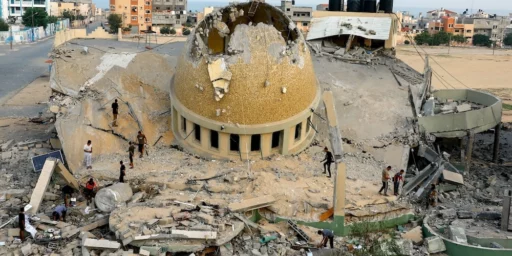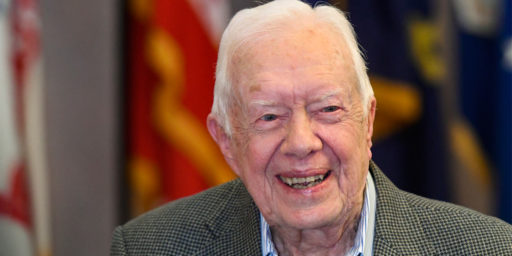THERE HE GOES AGAIN . . .
THERE HE GOES AGAIN. . . Former President Jimmy Carter argues in a NYT op-ed that war with Iraq would be unjust. He employs the language of Just War Theory to make his case but, unfortunately, it’s apparently not a language he speaks.
The war can be waged only as a last resort, with all nonviolent options exhausted. In the case of Iraq, it is obvious that clear alternatives to war exist. These options — previously proposed by our own leaders and approved by the United Nations — were outlined again by the Security Council on Friday. But now, with our own national security not directly threatened and despite the overwhelming opposition of most people and governments in the world, the United States seems determined to carry out military and diplomatic action that is almost unprecedented in the history of civilized nations. The first stage of our widely publicized war plan is to launch 3,000 bombs and missiles on a relatively defenseless Iraqi population within the first few hours of an invasion, with the purpose of so damaging and demoralizing the people that they will change their obnoxious leader, who will most likely be hidden and safe during the bombardment.
Michael Walzer, the preeminent living scholar of Just War Theory–and an opponent of this war–fully acknowledges that “last resort” means only that you have tried all options that have a chance of achieving your objectives and that it may be quite just to use force very early in a crisis if the goal is just and nothing else will achieve it. Walzer believes we have met this test in the case of Iraq, too. (Read his recent comments on this subject, and Just War as applied to Iraq generally, here.) The rest of what Carter says about “last resort” has nothing to do with that issue, so I’ll skip it.
The war’s weapons must discriminate between combatants and noncombatants. Extensive aerial bombardment, even with precise accuracy, inevitably results in “collateral damage.” Gen. Tommy R. Franks, commander of American forces in the Persian Gulf, has expressed concern about many of the military targets being near hospitals, schools, mosques and private homes.
Well gee frickin’ whiz. By Carter’s standard, all warfare beyond hand-to-hand combat fails to qualify as just war. Was World War Two a just war? Our ability to avoid hitting non-combatants is now almost infinitely better. It has improved by leaps and bounds since Gulf War I, even Kosovo.
Uh, no. That would work in the case of a retaliatory strike for a raid. Again, in the case of World War Two, the Germans didn’t attack the United States. Indeed, they probably never would have. For that matter, our retaliation against Japan far exceeded the injury suffered at Pearl Harbor. Just War doctrine requires that force must be proportional to the ends being sought and the threat faced. The fear, justified or not, is that Saddam will add to his arsenal of weapons of mass destruction, including acquiring nuclear weapons, and either use them against the US or its allies or sell them to terrorists who will do that. Dropping precision bombs on military targets, deposing a despot, and rebuilding Iraq as democracy seems a proportional response.
The attackers must have legitimate authority sanctioned by the society they profess to represent. The unanimous vote of approval in the Security Council to eliminate Iraq’s weapons of mass destruction can still be honored, but our announced goals are now to achieve regime change and to establish a Pax Americana in the region, perhaps occupying the ethnically divided country for as long as a decade. For these objectives, we do not have international authority. Other members of the Security Council have so far resisted the enormous economic and political influence that is being exerted from Washington, and we are faced with the possibility of either a failure to get the necessary votes or else a veto from Russia, France and China. Although Turkey may still be enticed into helping us by enormous financial rewards and partial future control of the Kurds and oil in northern Iraq, its democratic Parliament has at least added its voice to the worldwide expressions of concern.
This is certainly debatable. Traditionally, “legitimate authority” meant that war had to be prosecuted by governments rather than sub-national actors. There are some who argue that the signatories to the UN Charter are constrained to only use force approved by the Security Council. I would argue that, 1) this is nonsense and 2) the Security Council did authorize force, both in the Gulf War itself–of which this would technically be a resumption, given Saddam’s noncompliance with the truce–and in 1441. It is nonsense, in my view, to say that just wars can only be fought with Security Council approval since, as I’ve argued numerous times, that institution is virtually unworkable. The only use of force it has ever officially approved was Korea, and that was only because the Soviets were boycotting and the Chinese seat was accorded to the Taiwanese government rather than that of the PRC at the time. (Gulf War I was in accordance with numerous UN resolutions, but was not actually a UN action per se.) Have all the wars fought since 1945 been unjust?
The peace it establishes must be a clear improvement over what exists. Although there are visions of peace and democracy in Iraq, it is quite possible that the aftermath of a military invasion will destabilize the region and prompt terrorists to further jeopardize our security at home. Also, by defying overwhelming world opposition, the United States will undermine the United Nations as a viable institution for world peace.
Well, gee, we can never know for sure that things will be better off after a war. World War One made things better for a while, but led to World War Two. Winning World War Two solved one problem but led to the Cold War. But it’s hard to imagine that a Middle East without Saddam in power would be a worse place.
Now I remember why our hostages in Iran remained captive for 444 days under Carter’s governance and weren’t released until the middle of Ronald Reagan’s inaugural parade.




